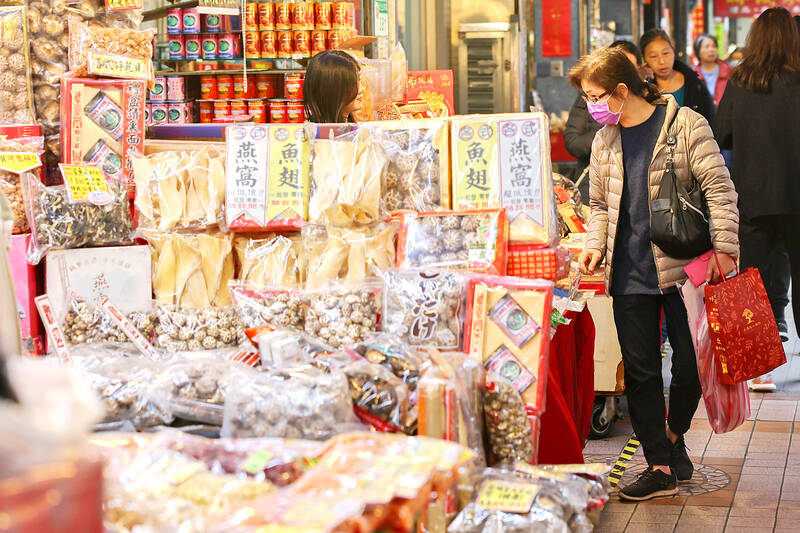The consumer price index (CPI) for last month stood at 1.79 percent from a year earlier, dropping below the central bank’s 2 percent target as goods and services grew more expensive but at a mild pace, the Directorate-General of Budget, Accounting and Statistics (DGBAS) said yesterday.
The inflation reading represented the lowest in seven months, but the statistics agency attributed the slowdown mainly to the timing of the Lunar New Year, which fell in January last year, making for a higher comparison base.
The CPI would have logged 2.4 percent in the absence of the holiday distortion, DGBAS official Tsao Chih-hung (曹志弘) said, suggesting that inflationary pressure could gain momentum this month when commercial establishments traditionally raise food and services charges to meet a pickup in demand over the Lunar New Year.

Photo: CNA
“People might feel the pinch more acutely,” since food costs, the largest chunk making up the index and an expense all consumers need to bear, advanced 4.1 percent, Tsao said.
Fruit prices spiked 20.86 percent due to lingering disruptions from inclement weather, the official said. Meat prices were up 5.63 percent, while processed food items and dining out costs rose 4.31 percent and 4 percent each.
By contrast, vegetable prices tumbled 14.54 percent year-on-year, as ample supply weighed on their value and helped mitigate overall food costs, Tsao said.
Core CPI, a more reliable long-term price tracker because it strips volatile items, increased 1.64 percent, also well inside 2 percent territory, DGBAS data showed.
Healthcare expenses advanced 3.12 percent on the back of copayment, treatment and drug price hikes, it said.
Garment prices climbed 2.47 percent ahead of the holiday, while shelter costs grew a moderate 1.75 percent, propelled by continued increases in home repair, rent and electricity charges, the official said.
Transportation and communications expenses inched up 0.51 percent and miscellaneous items squeezed a 0.3 percent rise, thanks to cheaper public transportation pass charges, as well as the favorable holiday effect, Tsao said.
Education and entertainment costs, the main inflation drivers in the post-pandemic era, both remained low last month due to the holiday timing, but might stage a noticeable comeback later this month, the official said.
Economists have said it is better to average the CPI data of the first two months to gain a better understanding of inflation trends and factor in holiday disruptions.
Tsao said it is unlikely that the reading would slow below the 2 percent threshold.
The producer price index, which measures price changes from a seller’s viewpoint, declined 0.46 percent, stagnant from a revised 0.47 percent retreat seen one month earlier, DGBAS said.
Raw material, mineral and basic metal product prices weakened further as end-market demand remained soft, it said.

Hon Hai Precision Industry Co (鴻海精密) yesterday said that its research institute has launched its first advanced artificial intelligence (AI) large language model (LLM) using traditional Chinese, with technology assistance from Nvidia Corp. Hon Hai, also known as Foxconn Technology Group (富士康科技集團), said the LLM, FoxBrain, is expected to improve its data analysis capabilities for smart manufacturing, and electric vehicle and smart city development. An LLM is a type of AI trained on vast amounts of text data and uses deep learning techniques, particularly neural networks, to process and generate language. They are essential for building and improving AI-powered servers. Nvidia provided assistance

DOMESTIC SUPPLY: The probe comes as Donald Trump has called for the repeal of the US$52.7 billion CHIPS and Science Act, which the US Congress passed in 2022 The Office of the US Trade Representative is to hold a hearing tomorrow into older Chinese-made “legacy” semiconductors that could heap more US tariffs on chips from China that power everyday goods from cars to washing machines to telecoms equipment. The probe, which began during former US president Joe Biden’s tenure in December last year, aims to protect US and other semiconductor producers from China’s massive state-driven buildup of domestic chip supply. A 50 percent US tariff on Chinese semiconductors began on Jan. 1. Legacy chips use older manufacturing processes introduced more than a decade ago and are often far simpler than

STILL HOPEFUL: Delayed payment of NT$5.35 billion from an Indian server client sent its earnings plunging last year, but the firm expects a gradual pickup ahead Asustek Computer Inc (華碩), the world’s No. 5 PC vendor, yesterday reported an 87 percent slump in net profit for last year, dragged by a massive overdue payment from an Indian cloud service provider. The Indian customer has delayed payment totaling NT$5.35 billion (US$162.7 million), Asustek chief financial officer Nick Wu (吳長榮) told an online earnings conference. Asustek shipped servers to India between April and June last year. The customer told Asustek that it is launching multiple fundraising projects and expected to repay the debt in the short term, Wu said. The Indian customer accounted for less than 10 percent to Asustek’s

Gasoline and diesel prices this week are to decrease NT$0.5 and NT$1 per liter respectively as international crude prices continued to fall last week, CPC Corp, Taiwan (CPC, 台灣中油) and Formosa Petrochemical Corp (台塑石化) said yesterday. Effective today, gasoline prices at CPC and Formosa stations are to decrease to NT$29.2, NT$30.7 and NT$32.7 per liter for 92, 95 and 98-octane unleaded gasoline respectively, while premium diesel is to cost NT$27.9 per liter at CPC stations and NT$27.7 at Formosa pumps, the companies said in separate statements. Global crude oil prices dropped last week after the eight OPEC+ members said they would